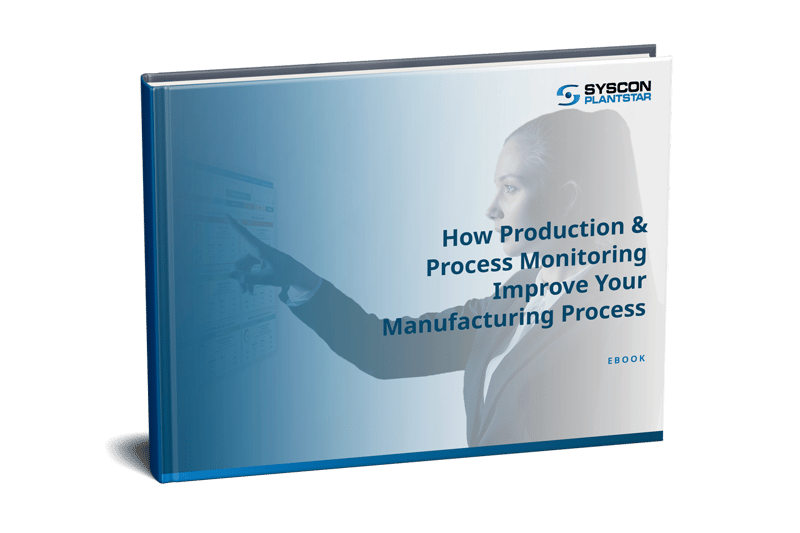SYSCON PlantStar BLOG
An MES Solution Improves All Levels of an Organization
Nov 22, 2022 4:45:00 PM / by PlantStar Team

Limited visibility into workflows has been a long-standing problem for manufacturing companies. A manufacturing execution system (MES) is an essential tool for breaking down data silos and opening up data access. Initially built for the factory floor, the benefits of an MES now extend throughout the organization.
Suppliers have historically managed the production process reactively, examining reports after a run, when it’s too late for needed changes to affect work in progress. Furthermore, information siloing often prevents visibility into what happens at each step in the manufacturing process, limiting this knowledge to individuals directly involved in each step. Performance information may be stored in a variety of formats (such as spreadsheets, email transmissions, and even on paper) and in many locations. For example, the quality control team may be the only ones who know how many defective parts are being produced.
Data collection and storage needs to be unified for employees to fully understand what is happening in the supply chain and on the production line. MES software makes this possible. All areas of a company can benefit from an MES. In addition to a comprehensive overview of the manufacturing process, the standardized, configurable interfaces of an MES work not only with existing machinery but also business applications, connecting supply chain and manufacturing process information to enterprise resource planning (ERP), total quality management, customer relationship management, and human resources applications.
Maximize Use of Manufacturing Assets
Suppliers currently grapple with a serious disconnect: they have lots of performance data, but employees do not leverage it. While the vast majority of manufacturers collect data; few analyze it; fewer use it to identify problems; and only a small fraction of these act upon it. So what opportunities are they missing?
An MES can drive improvement in overall equipment effectiveness (OEE). Systems can be programmed to create alerts, both positive and negative, and send them to plant personnel whenever certain events occur. At the end of a production shift, a plant manager begins the changeover process. If a robot starts to operate haphazardly, for example, they troubleshoot the device and quickly get it back to full functioning. With this information at their fingertips, plant executives can act now rather than later, enabling higher productivity.
Reduce Supply Chain Expenses
Suppliers are constantly on the lookout for ways to reduce expenses through better supply chain management. An MES integrates the supply chain, machine, production line, and shipment data. Such information becomes crucial to identifying problem areas, such as raw materials availability. The material lot tracking data analytics that an MES provides improves asset tracking. It traces lot numbers from ERP work orders through production management and associates raw materials to lots, jobs, work orders, and finished goods. Managers can see how long items sit idle, creating bottlenecks that have been arising, and make adjustments to improve yield.
Improve Quality
High product quality is essential to meeting customer demands and maintaining a successful business. However, creating high-quality products is a complex challenge because discrete manufacturing plants have many components. MES systems play a vital role in improving and maintaining quality by collecting data from the production process. This data provides manufacturers with the ability to address problems quickly and efficiently.
For example, SYSCON’s PlantStar MES software tracks:
- Cycle time
- Shot size
- Injection pressure
- Hold pressure
- Hold time
- Cushion
- Position
- Machine and tool cycles
- Good and bad part count
- Uptime and downtime
- Reject, assist, and downtime events
With all this information, manufacturers gain the insights they need to address quality problems faster and more effectively. They are far less likely to face product recalls or place customers at risk from poorly made products due to defective machines.
Reduce Inventory
Manufacturers often struggle to maintain consistent availability of materials, avoiding running low or carrying too much inventory. An MES can report on material usage by job, shift, day, or any other specific period. This information can then be exported to ERP systems for financial forecasting, enabling suppliers to accurately anticipate material usage and demand based on scheduled jobs and materials specifications. The more accurate the forecast, the shorter the lead times, and the more profitable the company becomes.
Boost Sales
With real-time information, suppliers can catch problems earlier in the manufacturing cycle and improve yields because batches will be less likely to be tainted and face product recalls. This also helps prevent the loss of customers because of missed deadlines or poorly made products. First-time customers become repeat business when a company delivers products on time that perform as advertised. When customers have positive experiences, they may also refer coworkers and business associates.
Manufacturers are under pressure to reduce costs and improve operations. An MES breaks down traditional data access barriers and supplies personnel across the organization with real-time information that can improve every department. To learn more about how you can enhance operations in your organization, subscribe to the SYSCON PlantStar blog.

Featured E-Book
Limited visibility into workflows has been a long-standing problem for manufacturing companies. A manufacturing execution system (MES) is an essential tool for breaking down data silos and opening up data access. Initially built for the factory floor, the benefits of an MES now extend throughout the organization. Download our eBook to learn more!
Subscribe to Email Updates
Posts by Topic
- Manufacturing Execution Systems (34)
- manufacturing solutions (16)
- MES 101 (12)
- Industry 4.0 (10)
- improve efficiency (9)
- mes software (9)
- mes solutions (9)
- Plastic Molding (8)
- Plastics Technology (8)
- Shop Floor Production (8)
- MES hardware (7)
- digital transformation (7)
- Reduce scrap (6)
- data-driven-decisions (6)
- lean manufacturing (6)
- process monitoring (5)
- product quality (5)
- Medical molding (4)
- lights-out manufacturing (4)
- manufacturing dashboard (4)
- production monitoring (4)
- Shop Floor Safety (3)
- supply chain management (3)
- ERP integration (2)
- Injection Molding Technology (2)
- defect collection (2)
- machine mes (2)
- process variables (2)
- digital strategy (1)
- labor gap (1)
- throughput (1)
